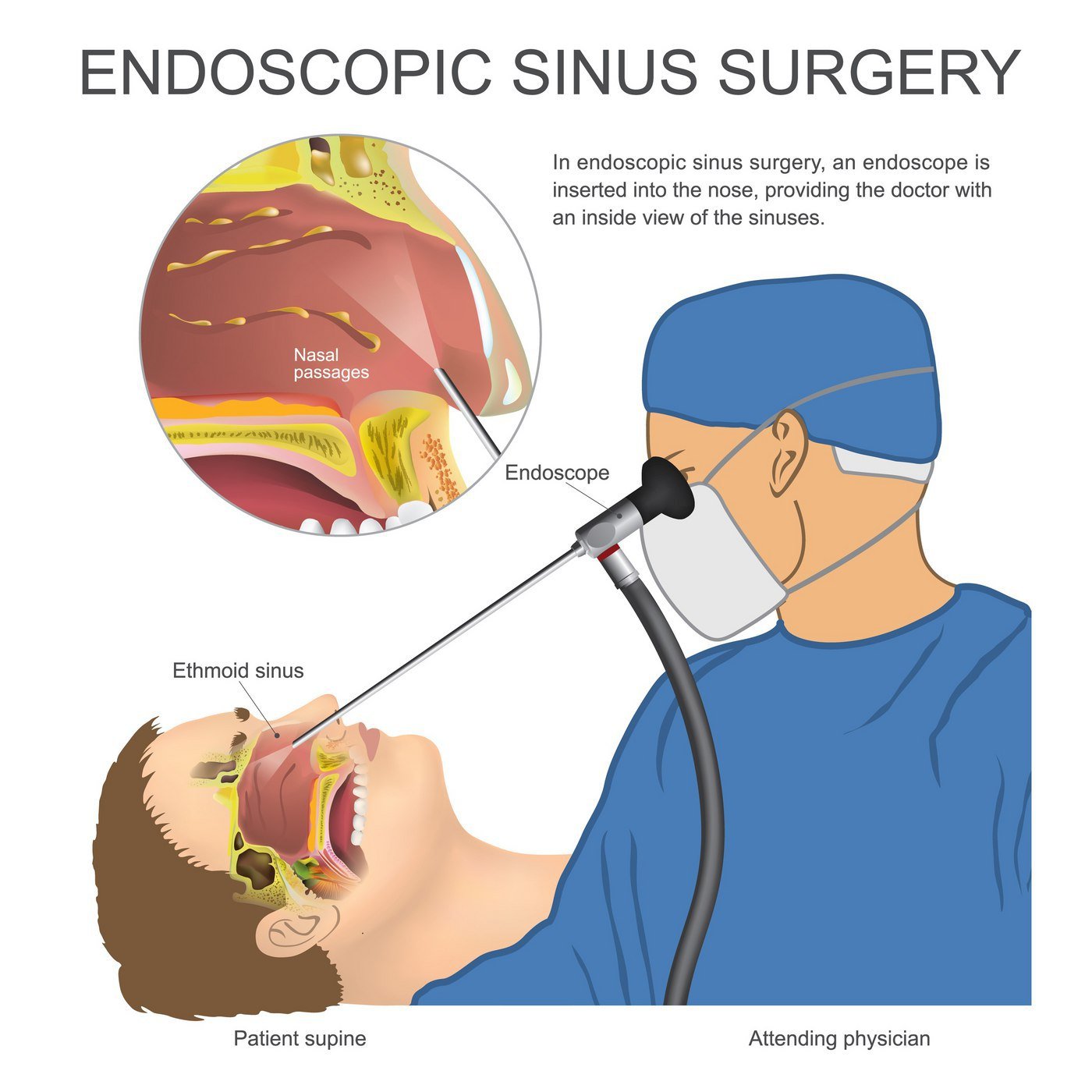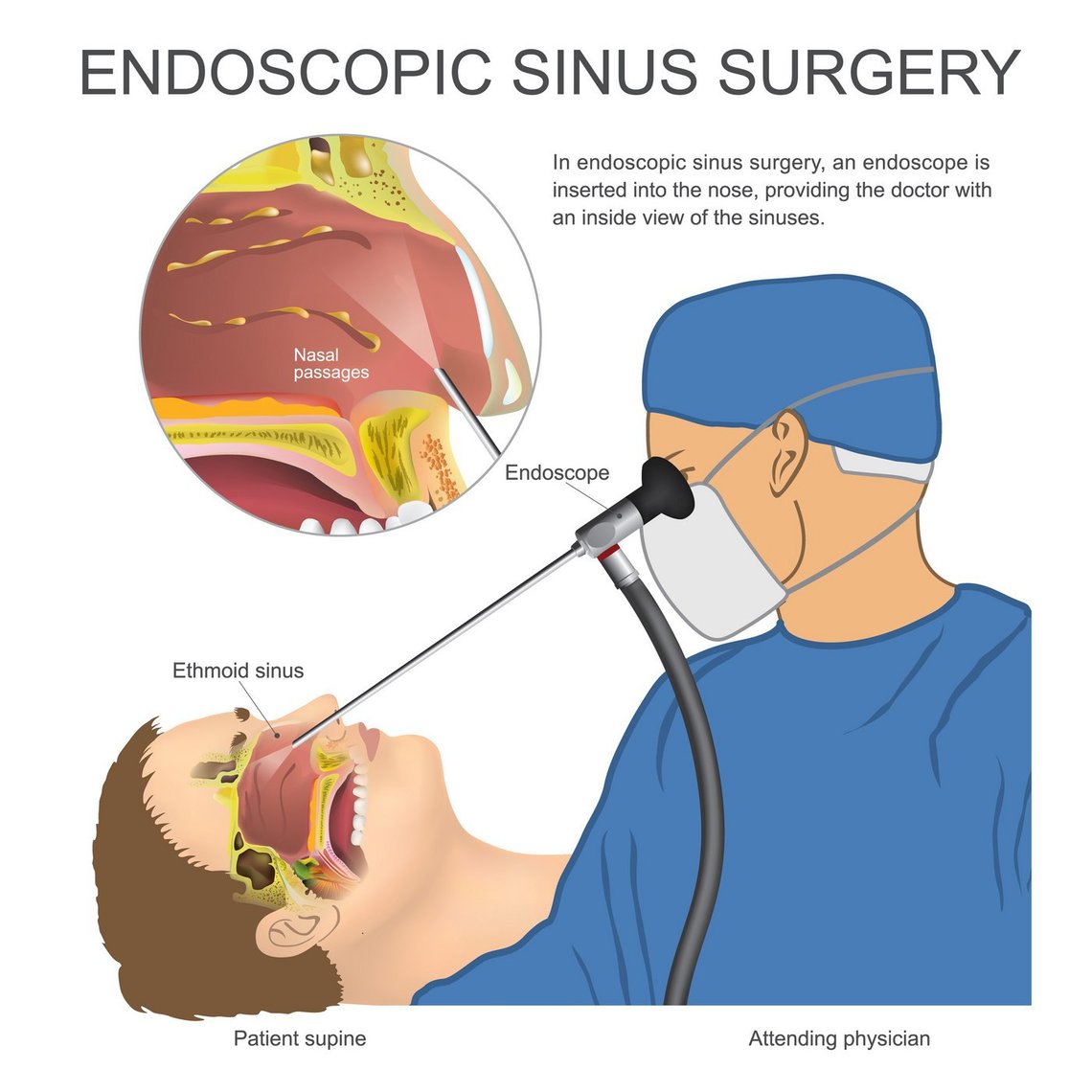What is a Nasal Endoscopy Procedure? (Indications, Side Effect & Uses)
February 27th, 2018 | 4 min. read
By Chuck Leider


If you've been told by your Houston ENT doctor you require a nasal endoscopy, your first thoughts may be, "what is a nasal endoscopy and what is that thing they'll be putting up my nose?" Not to fear, it's not as scary as it sounds.
What is Nasal Endoscopy?
Endoscopy is a diagnostic medical procedure that’s minimally invasive. Physicians use it to view interior surfaces of a tissue or organ, allowing them access to certain cavities of the body they normally can't see while performing a standard examination procedure.
Nasal endoscopy, also referred to as Rhinoscopy, is typically performed in an otolaryngologist's or ear, nose, and throat office where they have a direct, high-quality and magnified vision as they evaluate your sinus and nasal passages.
A nasal endoscope is an instrument that consists of a rigid, thin tube with fiber-optic cables. It connects to a video camera and light source where magnified images project onto a screen. The otolaryngologist then captures and records the endoscopic images to document for each patient.
During a nasal endoscopy procedure, the ear, nose and throat physician inserts the instrument into your nose and guides it through your sinus and nasal passages as they view the images of the area they're examining. The procedure helps with diagnosing and treating different health conditions. Sometimes, the physician may use small tools to perform certain tasks like gathering tiny tissue samples.
Indications for a Nasal Endoscopy
Nasal endoscopy indications may include:
-
Identifying disease in patients who are suffering from sinonasal symptoms, like facial pressure or pain, mucopurulent drainage, decreased sense of smell or nasal congestion or obstruction.
-
Evaluating unilateral disease.
-
Evaluating the medical treatment response in patients such as purulent secretions, inflammation and mucosal edema or resolution of polyps after treatment with antibiotics, antihistamines, oral steroids or topical nasal steroids.
-
Evaluating patients with impending complications or complications of sinusitis.
-
Debridging and removing mucus, crust and fibrin from blocked sinus and nasal cavities following functional endoscopic sinus surgery.
-
Obtaining a purulent secretion culture.
-
Evaluating potential pathology recurrence after functional endoscopic sinus surgery (FESS).
-
Evaluating the nasopharynx for Eustachian tube problems, lymphoid hyperplasia and nasal blockage.
-
Evaluating and taking a biopsy of nasal lesions or masses.
-
Evaluating anosmia or hyposmia.
-
Evaluating cerebrospinal fluid leak (CSF).
-
Evaluating and treating nasal foreign bodies.
-
Evaluating and treating epistaxis.
Findings of a study show office-based biopsy and nasal endoscopy are an important and safe diagnostic tool to evaluate sinonasal neoplasms. This procedure is normally safe and gives physicians the diagnostic information they require to make changes to treatment decisions, if needed. Procedure limitations do exist, generally accuracy-related.
Side Effects of Nasal Endoscopy
Overall a nasal endoscopy is a relatively low-risk procedure. However, as with any procedure, there's always the chance of potential nasal endoscopy side effects or complications, such as bleeding and mucosal trauma, especially in those who already have an increased risk for bleeding like those taking anticoagulant medicines (Coumadin, Plavix, etc.) or aspirin.
You could experience adverse reactions to anesthetics or topical decongestants received before your procedure. Therefore, your healthcare professional will verify if you have any allergies before they administer a topical medication.
Before your procedure, make sure you ask your physician if you need to stop taking any medications, such as blood thinners. Your physician will likely provide you with specific instructions about what you should and shouldn’t do before your procedure. For instance, you may be asked to refrain from eating and drinking for a certain period of time before your procedure.
Rarely is the procedure painful, however, if you have an unusually narrow nasal cavity or swollen nasal lining, you could experience some mild discomfort. Your otolaryngologist will spray your nose right before your nasal endoscopy to minimize discomfort with a:
-
Local anesthetic, temporarily numbing your nose and helping to minimize your likelihood of sneezing due to sensitivity.
-
Nasal decongestant, gently reducing any nasal membrane swelling you have to provide the endoscope with an easy passage.
They may use a pediatric-sized endoscope or additional numbing spray to prevent and ensure there's no discomfort.
Uses of a Nasal Endoscopy Procedure
Your healthcare provider may perform a nasal endoscopy on you if they need more information on issues like:
-
Nasal blockage
-
Nasal congestion
-
Nosebleeds
-
Nasal polyps
-
Rhinosinusitis (sinus and nasal infection)
-
Nasal tumors
-
Cerebrospinal fluid leak
-
Loss of ability to smell
The doctor may obtain specific details from the endoscopy such as the area of swelling of nasal tissue or bleeding. They may also take a look at a growth which could be cancer.
Sometimes, the physician may use nasal endoscopy as a treatment. They could use it on a child to remove something from their nose, for example.
They may perform an endoscopy to observe a sinus or nose problem treatment to see how it's working — shrinking of nasal polyps, for example.
In other cases, the endoscopy is the first step before a patient undergoes another procedure designed to help with many nasal congestion issues, the Vivaer Nasal Airway Remodeling procedure.
Other Nasal Endoscopy Uses
One of the most common uses for having a nasal endoscopy procedure done is rhinosinusitis. You might experience symptoms like facial pain, nasal blockage and greenish or yellow nose fluid. The doctor can use nasal endoscopy to check for polyps and swelling. They may gather pus from an infected area which will help them determine what the infection cause is and what treatment is best.
Your doctor may perform minimally invasive surgery using a nasal endoscope either in a surgery center or hospital. With this procedure, they use it to treat conditions like nasal polyps, sinus infection and nasal tumors. Your doctor doesn't even have to make an external incision.
Before agreeing to have the procedure done, ensure you know everything you need to know, including:
-
The procedure name
-
Why you're having the procedure done
-
The results you can expect and their meaning
-
The benefits and risks of the procedure
-
The physician performing the procedure and their qualifications
-
The potential complications or side effects
-
Where and when you'll be having the procedure done
-
What could happen if you don't have the procedure done
Using Nasal Endoscopy Instruments
In some cases, the healthcare provider may perform a nasal endoscopy and sinus and nasal cavity cleaning in the weeks after your sinus surgery to keep the cavities open. They will use different smaller instruments like forceps or suctions for these cases to perform these tasks.
Smaller instruments like these are designed specifically for sinus and nose use during a nasal endoscopy procedure. Otolaryngologists are normally extremely skilled with nasal instruments and the endoscope. Because a few instruments like these have a curved shape, it makes it easier for the doctor to reach inside the nose around the corners. The doctor often uses "angled" endoscopes with these types of instruments. They may use them either in the office during your otolaryngologist's routine surveillance or in the operating room.
Your Houston ENT doctor can use the nasal endoscopy to collect important information they need to come up with your individualized treatment plan. They will likely sit down and consult with you what this treatment plan is following your endoscopy.
Be sure you follow all instructions your physician provides regarding all medications and follow-up visits. In most cases, your doctor will wish to set up an appointment for a follow-up visit to check on the progression of your treatment. Unless you absolutely can’t, make sure you show up to all follow-up appointments since they ensure your health and well-being.
Contact us here at Houston ENT & Allergy if you have questions about the nasal endoscopy procedure. 281-649-7000

